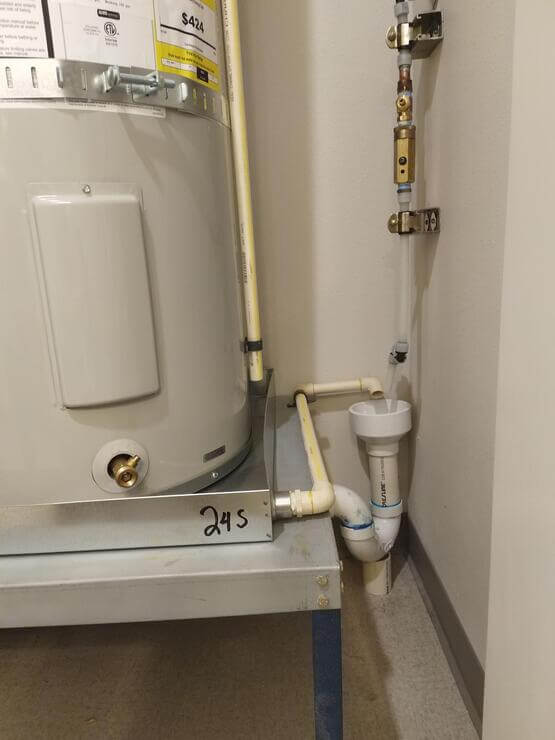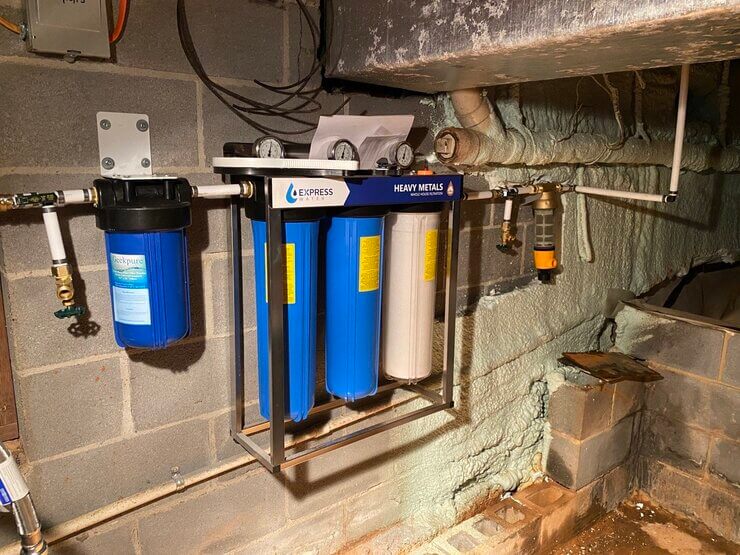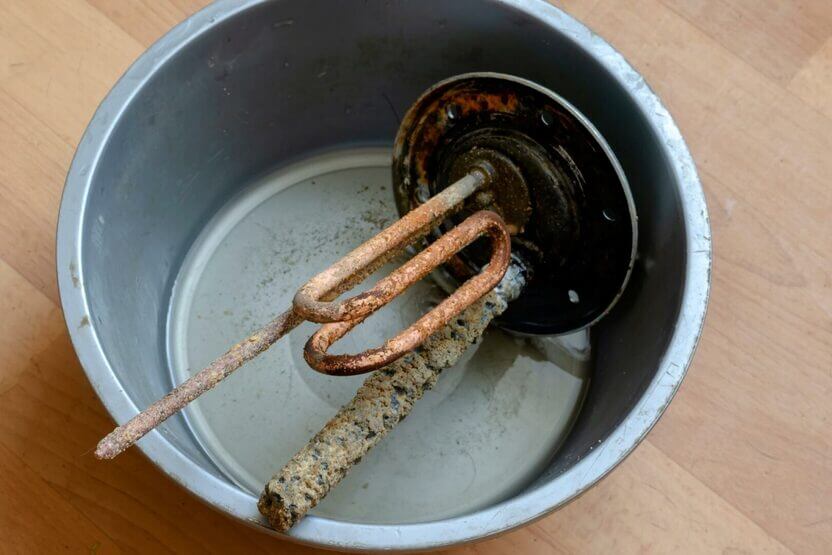Do you how to remove smell from water tank?
There are often reports in the city that the city water has a bad odor. Most of the time, the smell does not come from the water source itself but from water heater tanks.
Nevertheless, regardless of where you live, a bad smell coming from your water tank is not uncommon.
How To Remove Smell From Water Tank

Once you have established that the sulfur smell is coming from your water tank, you can find the best solution.
Usually, a sulfur smell comes from your water tank, due to high levels of sulfur-reducing bacteria or because of a corroded anode rod. You can try to replace anode or install water purification system.
The best way to solve the problem is to call a certified plumber. A plumber will inspect the water tank to find the leading cause of the smell coming from the water tank.
A Sulfur Odour Present In the Water
Before finding out how to remove odour from water, you first need to identify the source and the cause.
A sulfur odour coming from the water tank can happen in any home. Sulfur odour resembles the smell of rotten eggs. This type of smell can develop in water heaters, corroded iron pipes or city water lines.
Even if the city water is chlorinated, the smell can still occur. Most of the time, water with low chlorine residual and a high sulfate level will develop this kind of smell. Likewise, water that has been inactive for days or weeks can also develop this odor, also known as blackwater. [1]
Whether in the water line or water heater, bacteria is the main culprit that produces the rotten-egg smell. If the water in the water heater or waterline does not have enough chlorine, the bacteria level will be high. These microorganisms then react to sulfates and cause the water to smell bad.
If you are uncertain about the source of the smell you can test by opening your faucets. It might be that the water tank is not the source of the smell.
If the cold water has a smell, then the problem is most likely coming from your home pipes or the city water line. In this case, you will have to call your local water utility company and report the problem. [2]
However, if the smell is coming from the hot water faucet only, the smell is most likely developing in the water heater tank. By knowing this you can find the best solution how to remove the smell from the water tank.
Related: Hot Water Heater Smells Like Sulfur
How To Eliminate High Levels Of Sulfur-Reducing Bacteria?

If the problem lies within the water components, the tank will have to be flushed and disinfected. If you are familiar with a water heater’s functions and inner workings, you can do this yourself.
You will have to use a water heater odour killer, such as chlorine bleach. [3]
This solution will effectively remove high levels of hydrogen sulfide in the water. As the chlorine in the bleach reacts with the hydrogen sulfide, the “rotten egg” odour will be eliminated.
However, if you know nothing about water heaters, it is best to call a professional. A plumber will use efficient methods to flush and disinfect your tank. This will remove the bacteria and particles that create hydrogen sulfide.
If your water has a naturally high level of sulfur-reducing bacteria, the problem will most likely recur. [4]
Therefore it would be best to install a water purification system for the whole house as prevention. A purifier that specializes in removing hydrogen sulfide would keep the rotten egg smell at bay. For this installation, you can contact a plumber to find out which one is best for your needs.
What To Do If The Anode Rod Is Causing The Smell?

Another thing that can cause the water to smell bad is if its anode rod is corroded. Anode rods come forth in all standard tank-style water heaters and not in tankless water heaters. These rods are sacrificial, meaning they are meant to break down and will have to be replaced every few years.
The reason they are designed to corrode is to protect the water heater lining. Instead of your water heater rusting from the inside, the anode rod will draw rusty minerals and corrode instead.
If your anode rod corrodes completely, it will cause the water to smell sulfuric. In this instance you will have to replace the anode rod to get rid of the smell.
Keep in mind that aluminium anodes are best for homes with hard water and a high PH. On the other hand, magnesium anode rods are better for homes with soft water.
Magnesium or aluminum anode rods are not a good choice for tanks that have a high level of sulfur-reducing bacteria. This is because an abundance of free electrons are created during the natural corrosion process of the rods [5].
The sulfate-reducing bacteria will then use these electrons to create elemental sulfur, hence the rotten-egg smell. Therefore, it would be best to replace an aluminum or magnesium rod with a zinc alloy anode rod.
Other Odours Related To Water Heater Tanks
A sulfur smell is not the only odor that can occur from a water heater tank. It is important to identify the smell to avoid other problems down the line.
- Burning rubber or plastic
If your water heater smells like burning rubber or plastic, make sure to turn off the power source. After the power is off at the breaker, you can investigate the hot water tank. The plastic area around the switch can overheat and burn if it is mounted outside the water heater.
Another area that might be overheating and burning is the insulative coating on the wires. This usually occurs if the insulation is old or not adequately packed. This will eventually cause the wiring to come into contact resulting in the heating elements overheating.
Once you figure out the cause, you can adjust the plastic piece or replace the insulation. If the cause can not be located, then it is best to contact a plumber.
- Electrical burning
An electrical burning smell is a sign that something electrical is overloading. For example, an electric water heater has two standard components that can fail, causing a burning smell.
If a hot wiring smell of electrical fire is present, it is most likely an overheated electrical contact. This means you will have to check the wiring for arcing. Electrical connections are prone to erosion after years of operation. Thus the contact will heat up and arc, causing heat to generate at the connection rather than at the firerod.
In another case, a fire rod can crack and short out. This means that the fire rod has failed, resulting in the excess current to form a short. Thus the thermostat and wiring will heat and emit the electrical burning smell.
If any of these issues occur, it is best to hire a trained plumber for repairs.
- Burning dust
Dust and debris accumulate over time, even on water heaters. Therefore if you smell a burning dust smell coming from the water heater, dust is burning.
The best solution to this problem is to clean the water heater from dust and debris.
- Gas smell
If you have a gas water heater and smell gas coming from it, gas is leaking.
In such a gas, you should turn off the gas immediately and air out the house. To fix gas leaks, you can call a plumber or gas company.
However, keep in mind that gas can ignite and cause a fire. Therefore if you don’t know where to turn off the gas, get out of the home and call a fire department for help.
Read Also: AO Smith vs Richmond Water Heater
Final Thought
The rotten eggs smell coming from hot water is disgusting as a pile of sewage and a concern for many homeowners.
However, this does not mean the water is contaminated and harmful to you if you happen to swallow some. On the other hand, if the smell is from the cold water, it is best to contact your water distributor. Your local water supplier will be able to confirm whether the water is safe to drink.
Nevertheless, smelly-tap water or not, it is never good to drink or cook with water from the hot tap. The environmental protection agency warns citizens against consuming water from the hot faucet.
This is because hot tap water can leach harmful contaminants like lead from your home’s pipes. Therefore, it is best to never drink the water from the hot water faucet.
Either way, just because you are not drinking the water from the hot-water heater does not mean you need to live with a nasty smell. The best solution for a water heater that has been inactive for weeks is disinfection and flushing the tank. If the water heater is 13 to 15 years old, it might be time to replace it altogether.
Read Next: No Water In Shower But Plenty Everywhere Else

Michael Davis is a heating & plumbing expert who currently works as independent contractor in SC. He also writes for Plumbertip.
For almost 10 years he worked on various plumbing tasks across South Carolina.


